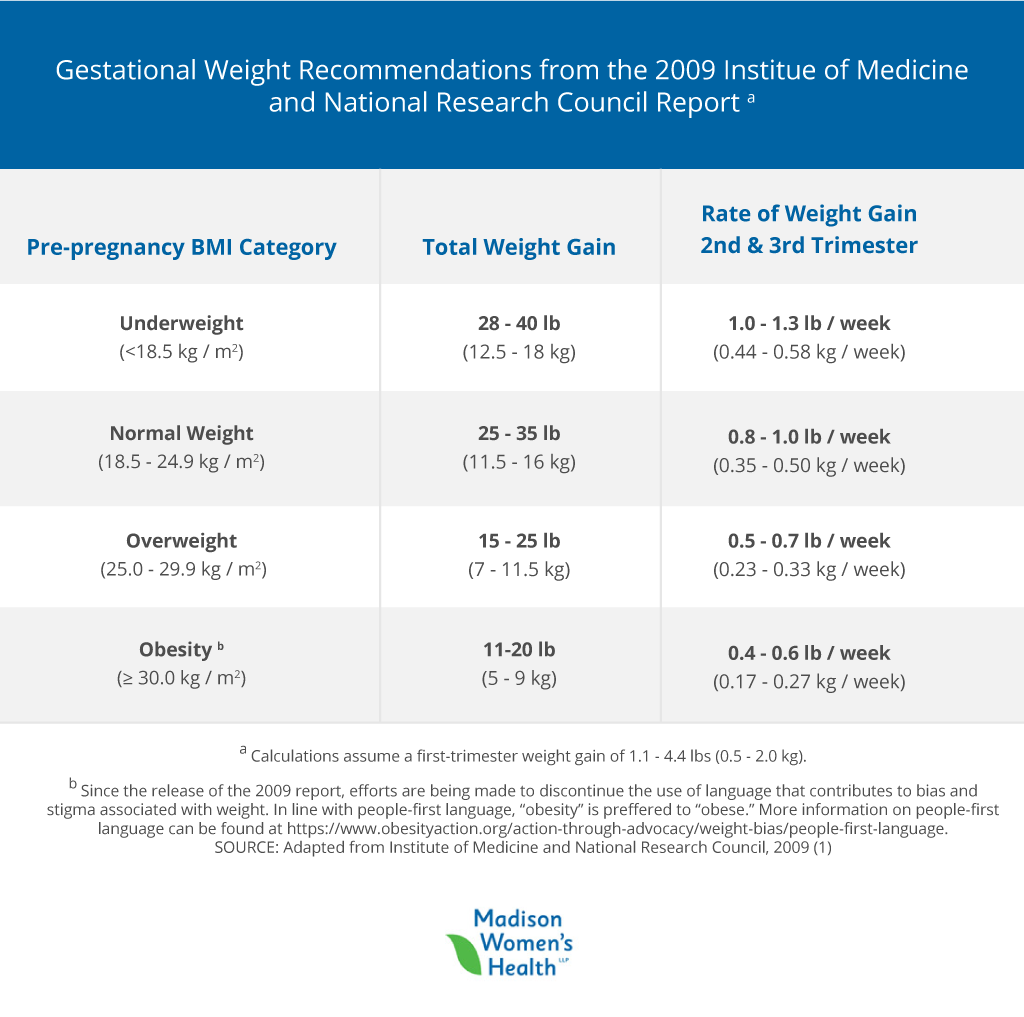Pregnancy Weight Gain: What is Average and What is Recommended by OBGYNs?
Your weight gain during pregnancy is important not only for your baby’s growth and development, but also for your health during and after your pregnancy.
It’s important to have a healthy perspective on pregnancy weight gain even though it can be a very sensitive, personal topic. While some women enjoy the “freedom of eating for two” as soon as the first trimester’s morning sickness goes away, others get upset when they see the scale creep past numbers they’ve never seen before. Most women are concerned about getting back to their pre-baby weight.
But a healthier perspective falls somewhere in the middle.
The weight you gain while pregnant supports your baby’s growth and development while you are pregnant and supports breastfeeding your newborn. However, too much weight gain can lead to problems like diabetes, heart disease, pre-term delivery, or even miscarriage and still birth. And even your pre-pregnancy weight affects your child’s weight and health as they grow older.
Paying attention to your pregnancy weight gain and returning to your pre-baby weight is not about meeting body image or societal standards—rather, it’s about achieving optimal health for you and your baby. At Madison Women’s Health, we care about your health and your baby’s health. That’s why we want to help you understand the recommended weight gain for pregnancy and the risk factors for carrying an unhealthy amount of weight while you’re pregnant.
So what is the “right” amount of weight you should gain while pregnant?
The National Academy of Medicine created these guidelines to help women estimate how much weight they should gain while pregnant, based on her BMI (body mass index) before pregnancy.
Average Weight Gain During Pregnancy:
- Underweight: Gain 28-40 pounds
- Healthy weight: Gain 25-35 pounds
- Overweight: Gain 15-25 pounds
- Obesity: Gain 10-20 pounds
If you have twins, you’ll gain a little more weight:
- Healthy weight: Gain 37-54 pounds
- Overweight: Gain 31-50 pounds
- Obesity: Gain 25-42 pounds
Gaining Weight at the Right Rate
Your pregnancy weight gain will be gradual, with some jumps and plateaus. What matters the most is your overall weight gain. Most women don’t gain very much weight during their first trimester. But in the second and third trimesters, you can expect to gain 1/2 to 1 pound per week.
Your OBGYN will track your weight gain with you at your monthly check-ups and may recommend changes to your nutrition or activity levels. Experiencing major weight gains, like 15 pounds in 4 weeks, would not be considered healthy. Your doctor will make recommendations to help you slow your weight gain.
 Source: https://nam.edu//www/wp-content/uploads/2019/12/Table-1.png
Source: https://nam.edu//www/wp-content/uploads/2019/12/Table-1.png
What Makes Up Your Pregnancy Weight
Based on a healthy pregnancy weight gain of about 25 pounds, this is where your pregnancy weight goes:
- baby: 7-8 lbs
- amniotic fluid: 2 lbs
- placenta: 1.5 lbs
- increased blood volume: 3-4 lbs
- increased fluid volume: 2-3 lbs
- larger breasts and uterus: 3-5 lbs
- increased fat stores to support nutrition during pregnancy and for breastfeeding afterward: 6-8 lbs
Risks of Gaining Too Much Weight While Pregnant
Your weight before and during pregnancy plays a large role in your health and your baby’s health. If you are overweight at the time of conception, or if you gain more than the recommended amount during pregnancy, you and your baby can be at risk of the following:
- fetal anomalies,
- preeclampsia,
- heart disease,
- gestational diabetes,
- depression,
- stopping breastfeeding early,
- developing sleep apnea,
- preterm delivery,
- delivery requiring induction,
- C-section,
- miscarriage,
- and still birth.
In addition to those risk factors, babies who are born to women who are obese are also at risk of:
- higher percentage of body fat,
- childhood obesity,
- lifelong metabolic syndrome,
- and asthma.
But there is good news! If women who are overweight or who have obesity lose even a small percentage of weight prior to conception, they can impact the health of their pregnancy. For example, if a woman weighing 300 pounds loses just 15 pounds, she would improve both her health and her baby’s health. A 5% weight loss is the perfect starting goal prior to pregnancy – and can reduce the risk of complications. Once that goal is reached, it’s good to reassess and set a new goal.
Risks of Gaining Too Little Weight While Pregnant
Some women struggle to gain weight during pregnancy. This is typically caused by hyperemesis, which is excessive nausea and vomiting in pregnancy. Eating disorders that lead to continued restrictive eating are also causes.
If a woman doesn’t gain enough weight, her baby is at risk because it isn’t getting the proper nutrients. Babies born to underweight women are at risk of:
- being small for gestational age,
- growth problems,
- and failure to thrive.
How to Achieve Healthy Weight Gain While Pregnant
Instead of becoming anxious about weight gain or permissive about unhealthy eating habits, focus on staying active and eating a balanced diet.
Make an eating plan
Choose a healthy eating plan that you can continue. There isn’t one specific pregnancy diet to follow. Instead, your healthy pregnancy diet should consist of lean proteins, healthy fats, fruits and vegetables. (Whether my patients are pregnant or not, I usually recommend the Mediterranean diet—it meets all the nutrition requirements, isn’t very restrictive, and will give you many satisfying meal plan options.)
Eat nutritious food
Focus 95% of your diet on healthy, nutritious food. Then, the remaining 5% should be other choices you really enjoy. If ice cream is your thing, take time to savor it—it’s ok! For more information about food during pregnancy, read our article about food cravings, aversions, what to eat and what to avoid.
Add a Few Calories
Add about 300 calories per day to maintain a healthy weight while you’re pregnant. That’s like adding another slice of bread, a cup of cottage cheese, or a couple more ounces of meat at your meals. If you are overweight, you will not need to add as many calories. There is no need to “eat for two!”
Listen to your body
Pay attention to your hunger cues. Stop eating before you feel too full.
Stay Active
Stay moderately active every day. If you struggle with your weight or body image, your pregnancy is a great time to reset your focus on overall health and establish healthy eating and exercise habits. You’ll be making a positive step for your child and yourself.
Any patient at Madison Women’s Health who starts a pregnancy when overweight or obese is given the option of a nutrition consultation. When you work with a nutritionist, you will learn how to choose healthier options, how to create healthier habits, and even how you could change your dietary preferences.
Getting Back to Your Pre-Baby Weight
The majority of women gain a healthy amount of weight during pregnancy, and much of that weight is lost soon after delivery. But about 60% of the time, women still retain about 10 pounds of their pregnancy weight gain 12 months later. And 40% of women maintain 20 pounds of their weight gain even after their baby is one year old.
When should you lose that baby weight so it doesn’t become a permanent weight gain?
- Weeks 1-6: Don’t worry about your pregnancy weight for your first six weeks with your new baby. Instead, focus on recovery, connecting with your baby, getting enough sleep, and establishing breastfeeding. Check with your OBGYN about resuming more activities at your postpartum visit!
- Months 3-6: It’s okay to begin working toward a healthy weight at this point. This should be gradual and your diet should continue to support breastfeeding.
- Months 7-12: Add more activity to your daily routine. Just as you gained your pregnancy weight gradually, you will lose it gradually. Give yourself time to lose the weight in a healthy way.
If you haven’t returned to your pre-baby weight by the time your baby is one year old, then consider making more changes to your nutrition and exercise. You can also request a nutrition consult to learn how to get all the nutrients your body needs without overdoing it on calories.
At Madison Women’s Health, we want to support your health before, during, and after your pregnancy. We’re here to help you learn how to make the best decisions so you can be well.














